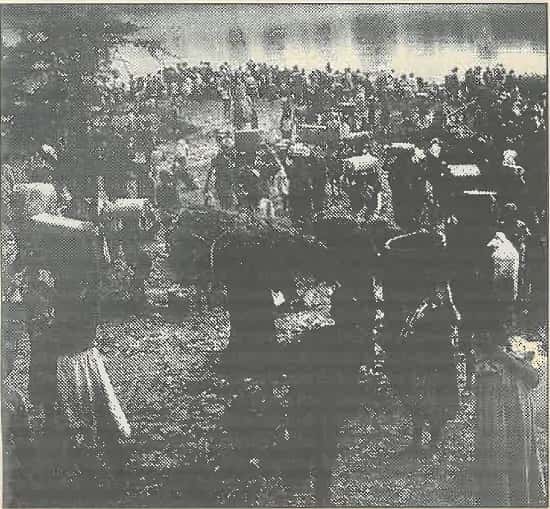
Fight Racism! Fight Imperialism! No. 119, June/July 1994
The shooting down of the aircraft in which President Habyarimana of Rwanda and President Ntarymira were travelling on 6 April signalled the start of a savagery so frenzied that in five weeks between a quarter and a half of a million people were slain and 400,000 made refugees.
Some facts about Rwanda:
- population in 1993: 7.25 million children per woman: 8.1
- by the age of five, one in five children have died
- literacy rate: 64 per cent for men, 37 per cent for women
- military spending per soldier: $6,800 pa
- health spending per person: $3 pa
- per capita income: about 60 pence a day
- newspapers produced: one for every 10,000 people
In 36 wars and civil wars fought in Sub-Saharan Africa since 1960, over six and a half million people have been killed. Add to these the dead of Rwanda — barbarism! A barbarism born of colonialism and imperialism.
The Watutsi entered what is now Rwandan territory in the fifteenth century, coming from Ethiopia. Their cattle ownership resulted in a stratified society in which Hutu were cultivators and cattle rearers and Tuwa were craft workers. German colonisation, which began in 1897, used this structure to support its rule. In 1919 Britain allocated German East Africa to itself apart from Ruanda-Urundi which was given to Belgium. The Belgian Bishop of Rwanda advised the colonisers to preserve the dominant role of the ‘Tutsi caste’, saying its removal ‘would lead the entire state directly into anarchy and to European-hating communism.’ The Hutu majority came to regard the Tutsi as part of colonial oppression.
A farm workers’ revolt in 1959 and civil war removed direct colonial rule, and saw UN-supervised elections which resulted in the formation of the Hutu-dominated Republic of Rwanda in 1962. An ensuing civil war claimed 20,000 lives and drove 160,000 Tutsis into exile. Hutu power was to be based on land ownership, and the Tutsi were stripped of the privileged position offered them by colonialism. In 1973, Colonel Habyarimana took power and established a Hutu ruling clique that controlled farming, commerce and banking, and introduced an ‘open door’ policy to foreign investment. The clique ruled in close association with France and Mobutu’s Zaire. Coffee production for export grew to account for 81 per cent of foreign earnings while per capita food production fell by over 27 per cent in the 1980s. Between 1980-88 Rwanda’s terms of trade (prices of exports relative to imports) fell 47 per cent as coffee prices halved. The sheer pressure of imperialist exploitation was bound to trigger a social explosion.
In September 1990 a mainly Tutsi force entered Rwanda from Uganda to stage an uprising. It was put down by French, Belgian and Zairean troops — a prelude to today’s slaughter as the two rival factions battle it out. In 1992 over 300 Tutsi were murdered by the governing party’s youth militia. Now, 33 years after, the UN came to supervise Rwanda’s first election, and after what is truly a genocide, the UN Is preparing to return. Its mission, to select a new batch of chosen placemen to supervise the plunder of Africa.
Over the past decade deteriorating terms of trade have cost Africa $12 billion a year. Foreign debt has tripled to $180 billion and Sub-Saharan Africa, the poorest region on earth, repays its creditors $10 billion a year, four times as much as its governments spends on health and education. Unemployment is over 100 million and wages have fallen by a third from their 1970 level. Everywhere you look across Africa you see the results: Sudan, Somalia, Liberia, Sierra Leone, Angola, Mozambique, Zaire, Rwanda … crisis, war, an inferno lit and fuelled by imperialism.
Trevor Rayne




